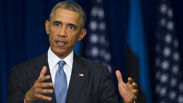
Obama likely to adopt policy of patient, uncompromising war against ISIS
צילום: AFP
ISIS poses an impossible dilemma for Obama
Analysis: Can a strategy even be devised against a stateless, borderless or shapeless element?
If anyone had asked US President Barack Obama about ISIS in August 2013, he would have probably thought it was the acronym of an unfamiliar government agency or a rapper's stage name.
In the summer of 2013, the Western intelligence agencies failed to realize that an assortment of Sunni gangs, demanding their share in the crumbling Iraqi government and revenge against the Shiites, were uniting.
What appeared on the intelligence screens as an amorphous ameba, moving aimlessly in no particular direction, turned into a monster which is very dangerous even if its size is overestimated. The al-Qaeda threat had also been downplayed until September 11, 2001.
The map of terror organizations sketched by the American intelligence in the past year included global al-Qaeda and its different branches in Maghreb and the Arabian Peninsula, al-Shabaab in Somalia, the remains of the Afghan Taliban, Boko Haram in Nigeria, Hamas in Gaza and, on the bench, Hezbollah in Lebanon.
If anyone had told Obama at the time that a murderous, messianic Sunni militia with sociopathic characteristics would declare an Islamic caliphate in the Levant, he would have likely thought it was a simulation game.
Now think about the jolting August the American president experienced in 2014: The Iraqi government is collapsing, and American planes are attacking ISIS targets in the northern part of the country. Obama also ordered strikes within Syria. Israel and Hamas are waging a war in Gaza for nearly two months. Libya is disintegrating into anarchy. Russian President Vladimir Putin is still defying international pressure and threatening to invade eastern Ukraine.
And that's not all: The negotiations between the world powers and Iran over the nuclear issue are being resumed while the US has a shared interest with Iran against ISIS (as well as with, I hate to admit, Syrian President Bashar Assad's regime).
Obama is currently visiting the Baltic countries on his way to a NATO summit in Wales. On the surface, the key issue is the Russian crisis in Ukraine, but in practice all eyes are on ISIS. A week ago, Obama faced the world and said candidly what an American president should never say: "We don't have a strategy yet."
Tactically, the Americans are carrying out efficient airstrikes against ISIS in northern and western Iraq, and quietly in Syria as well. But the main question remains unchanged: What is the strategy? And can a strategy even be devised, phrased and executed against a stateless, borderless or shapeless element like ISIS?
This is a complicated dilemma, which is in fact impossible. And it is not necessarily advisable to formulate an overall strategy and an organized policy against the diversity, the uniqueness, the frequent changes and the instability created by the different crises in the Middle East in the past two years.
The only strategy adopted by Obama in the past in Pakistan, Yemen and Somalia is a patient, uncompromising war, using a great amount of force against terror. This will be the policy against ISIS as well.
Alon Pinkas served as Israel's consul-general in New York.










